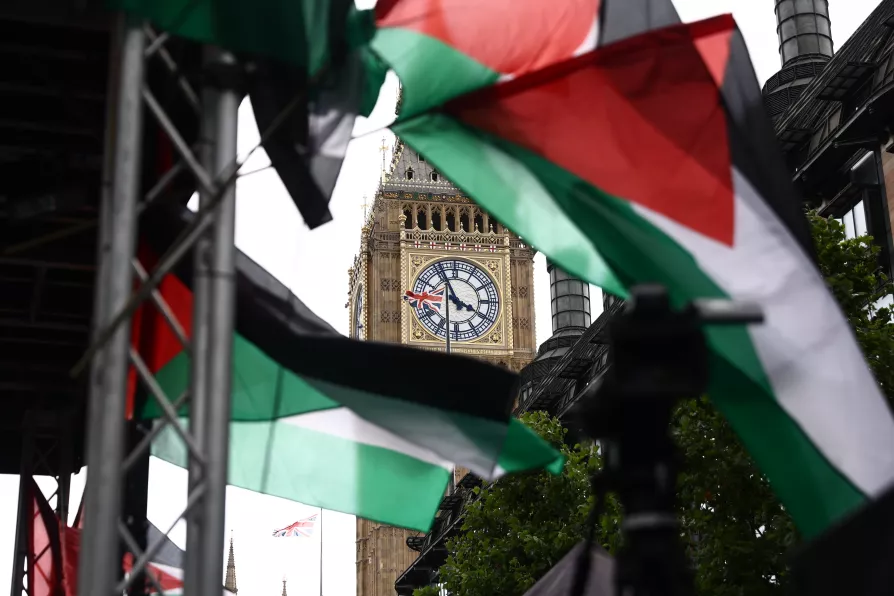
 People take part in a pro-Palestine march in central London organised by the Palestine Solidarity Campaign, July 6, 2024
People take part in a pro-Palestine march in central London organised by the Palestine Solidarity Campaign, July 6, 2024
THE weekend’s Palestine solidarity demonstration was barred from marching past Downing Street, but the new government should heed its message nonetheless.
Complacency at a huge majority should not dupe Labour into thinking it can ignore the anger over British complicity in Israeli war crimes through arms sales, logistical support and the use of RAF bases on Cyprus by the United States to supply the Israeli military.
Its majority, obtained on a smaller vote than it received when losing badly in 2019, is the product of Tory collapse, not voter endorsement, and Palestine is an issue which did Labour real damage on Thursday.
It lost four seats to independents standing on a justice for Palestine platform. One MP to lose his seat, Jonathan Ashworth, would otherwise be sitting round the Cabinet table this week. One who is, Wes Streeting, survived by the skin of his teeth — British-Palestinian challenger Leanne Mohamad coming within a few hundred votes of ousting him.
Even leader Keir Starmer himself should be wary: he lost 18,000 votes on his 2019 result, fully half his constituency support, and many of those voters will have been motivated by anger over Palestine.
The new government could signal change quickly. In opposition, David Lammy said Labour respected the International Criminal Court (ICC’s) mandate and would seek to implement arrest warrants if these are issued for Israeli leader Benjamin Netanyahu and Defence Minister Yoav Gallant.
In the days before the election we learned that the Conservative government was intervening to try to block those warrants, submitting a challenge to the ICC’s authority to try crimes committed on Palestinian territory — a disgraceful procedural bid to shield war criminals from justice and a lifeline for Netanyahu as Israelis themselves mass in the streets for his departure.
Lammy could announce now that Britain acknowledges the ICC’s mandate in Palestine in line with Palestine’s membership of the court.
He used his first interview as Foreign Secretary to point to Labour’s support for a ceasefire, adopted belatedly earlier this year when given a green light by Washington to do so.
The last government too claimed to want a ceasefire, backing this at the UN security council, but proved its words were empty by continuing to supply arms. Labour should announce an end to arms sales and close the Cyprus bases to Israel-bound traffic.
Nothing in Starmer’s record as opposition leader suggests this is likely. Tomorrow his first international summit as PM will be that of the Nato military alliance in Washington, and we can bet he will use it to trumpet again his unswerving loyalty to the US-led world order.
So he must be pressed to prioritise peace, including from within his own party.
Saturday’s peace demonstration took inspiration from being addressed by newly elected independents: living proof that justice for Palestine matters to the public.
And Palestinian ambassador Husam Zomlot’s acknowledgment of the importance to Palestinians of Jeremy Corbyn’s re-election was a reminder that what played out in Islington North last week had a global significance.
But it was sad, again, to see no Labour MPs on a platform for peace. Few have dared to make that stand since Starmer threatened to withdraw the whip from those who signed a Stop the War Coalition statement on Russia’s invasion of Ukraine in February 2022.
But not only are wars raging in the Middle East and Europe that threaten to ignite whole regions, the US drive to an apocalyptic new world war, against China, will likely continue whoever wins its own election this autumn.
If MPs felt uncomfortable attacking the leadership when trying to oust the Tories, that argument is gone. Whether Britain keeps fuelling wars or becomes a force for peace is now up to Labour.
We need its socialist MPs to raise their voices on that question.














